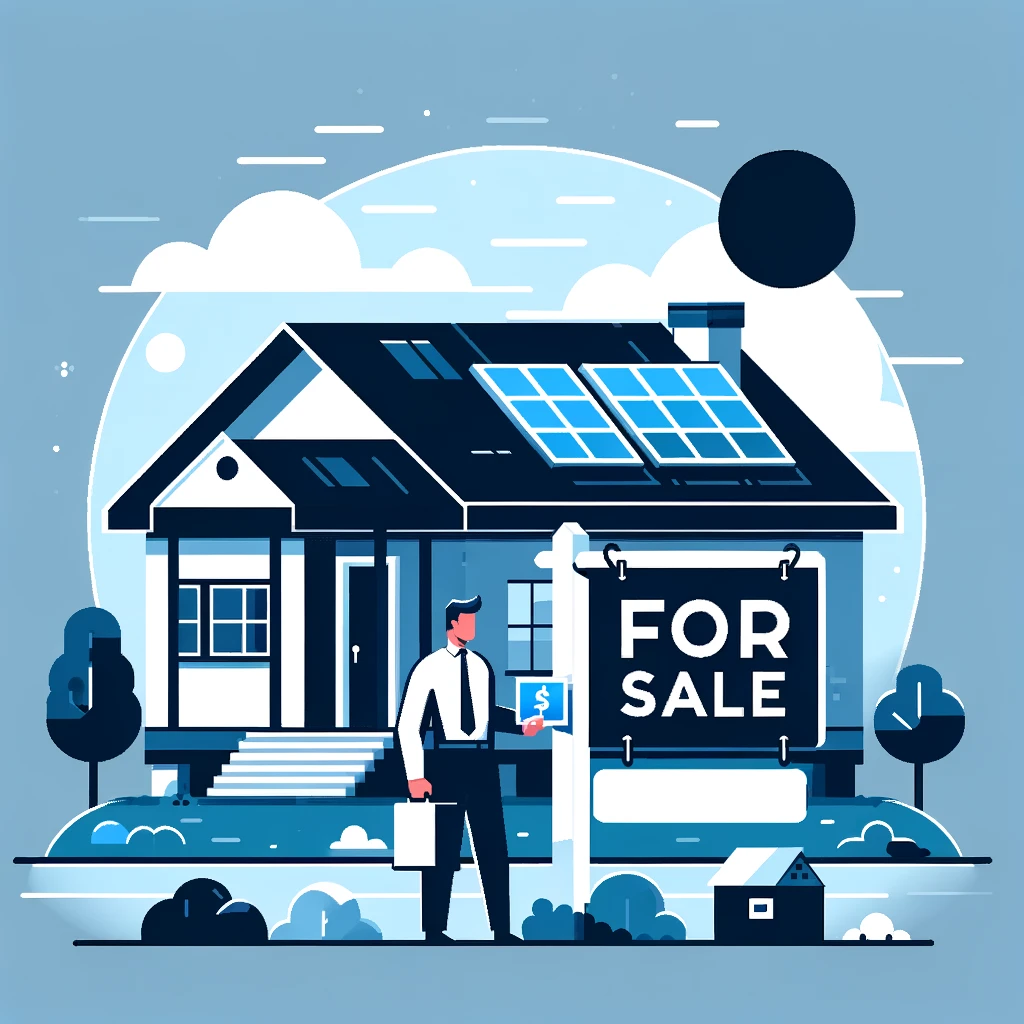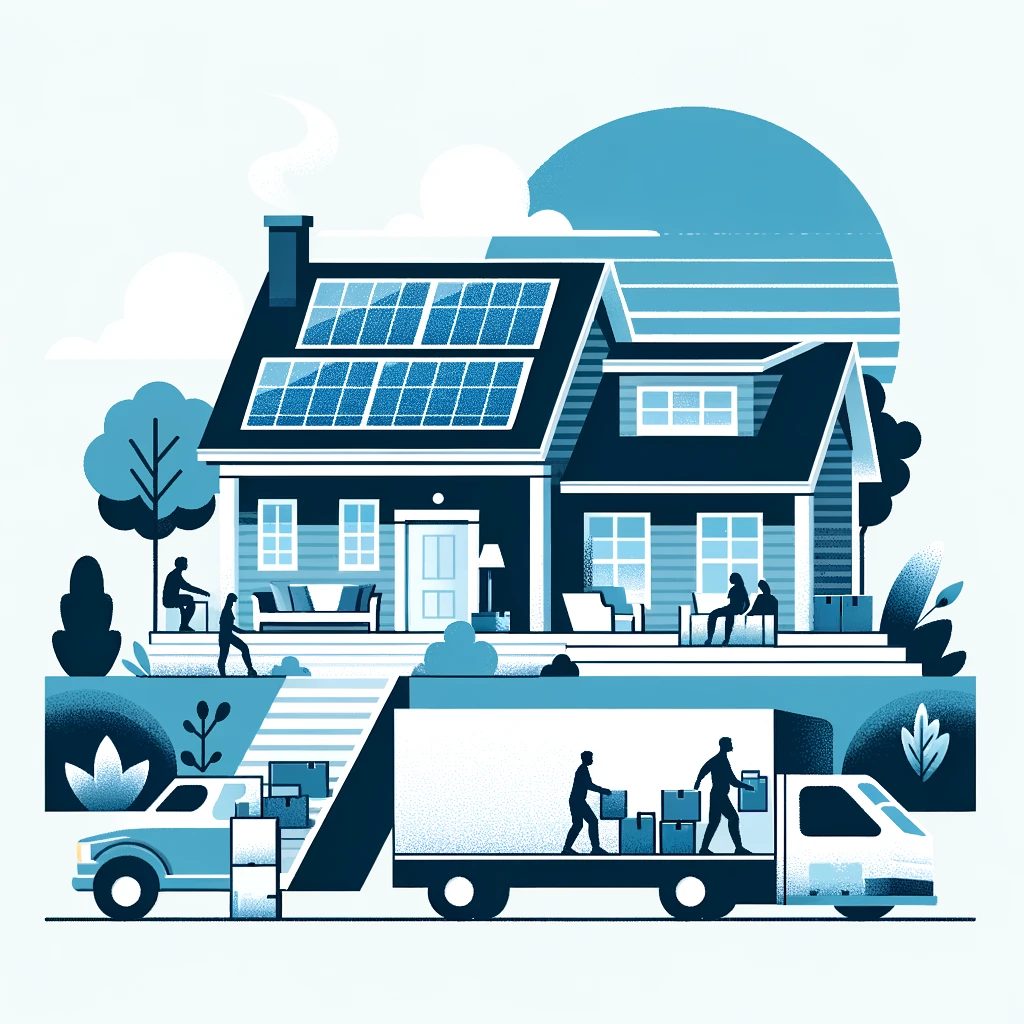Want Solar Panels But Moving Soon: Is It Worth the Investment?
Are you considering installing solar panels but unsure if it’s a wise decision because you’re planning to move soon?
It’s a valid concern, and one that many homeowners face…
Solar panels can be a significant investment, so it’s important to evaluate whether it makes financial sense given your impending move. In this article, we’ll jump into the factors you should consider when deciding whether to get solar panels if you’re moving in the near future.
First, let’s address the elephant in the room: the cost. Solar panel systems don’t come cheap, and the upfront expenses can be high. However, don’t let that discourage you just yet. The federal residential clean energy credit can help offset some of the costs by providing a 30% tax credit on the total installed cost of your solar panel system. This means you could potentially get a significant chunk of your investment back from the government. But remember, this credit is only applicable if you have sufficient tax liability. So, if you’re a senior citizen or living on a fixed income, the financial benefits may not be as high.
Additionally, it’s essential to consider the payback period of your solar panel system. Thanks to net metering, you have the opportunity to sell any excess energy you generate back to your utility company. This can help speed up your payback period and make your solar investment more financially viable. However, keep in mind that net metering programs vary by state, so it’s important to check with your utility provider to determine if it’s available in your area.
In the following sections, we’ll explore these factors in more detail and provide you with expert guidance to help you make an informed decision about whether to invest in solar panels if you’re planning to move soon. So, let’s dive in and shed some light on this pressing question.
Key Takeaways
- The decision to install solar panels when moving soon should consider factors such as the length of time in the current residence, short-term cost savings, and the importance of environmental impact.
- Installing solar panels can increase property value and attract potential buyers who are interested in energy-efficient homes.
- Take advantage of available tax incentives, such as the federal residential clean energy credit, to offset some of the upfront costs of installing solar panels.
- Consider the local perception towards solar energy in your area, as it may impact the property value and marketability of your home.
- Evaluate the return on investment by considering upfront costs, potential energy savings, and the impact on resale value.
- When moving, transferring solar panels to a new home can be difficult and expensive, while selling the panels with the house can be a selling point for potential buyers. Discussing with potential buyers is crucial in ensuring their understanding and commitment towards maintaining and utilizing the solar panels.

Factors to Consider when Wanting Solar But Moving Soon
Length of Time in Current Residence
Before making a decision about installing solar panels when you’re planning to move soon, it’s essential to consider the length of time you will be staying in your current residence. If you are only planning to live in your home for a short period, it may not be worth the investment of installing solar panels. Solar panel systems typically have a payback period of several years, meaning it takes time to recoup the initial cost through energy savings. If you do not anticipate staying in your current home long enough to see a significant return on investment, it may be best to hold off on installing solar panels.
Short Term Cost Savings
While the long-term financial benefits of solar panels are well-known, it’s also important to consider any short-term cost savings. If you are planning to sell your home in the near future, solar panels can be an attractive selling point. According to research, homes with solar panels often sell for a higher price and spend less time on the market. Potential buyers are drawn to the idea of reduced energy bills and a more sustainable lifestyle. So, even if you won’t be directly benefiting from the long-term savings, you can still reap the benefits of increased property value and a potentially quicker home sale.
Environmental Impact Importance
If reducing your carbon footprint and contributing to a cleaner environment is a priority for you, then installing solar panels may still be worthwhile, even if you’re planning to move soon. Solar panels generate clean, renewable energy and significantly reduce greenhouse gas emissions. By installing solar panels, you are taking a proactive step towards sustainability and making a positive impact on the environment. So, if the environmental benefits of solar energy align with your values and principles, it may be worth considering solar panels, regardless of your future plans.
Increase in Property Value
One of the potential benefits of installing solar panels, even if you’re moving soon, is the increase in property value. As mentioned earlier, homes with solar panels often sell for a higher price and spend less time on the market. This increase in property value can offset some of the initial costs of installing solar panels, making it a worthwhile investment. Additionally, having solar panels installed may attract potential buyers who are interested in energy-efficient homes, giving you a competitive edge in the real estate market.
Available Tax Incentives
When considering whether to install solar panels, it’s important to take advantage of any available tax incentives. The federal residential clean energy credit provides a significant financial benefit to homeowners who install solar panel systems. In 2022, Congress increased the solar investment tax credit to 30% and extended it through 2032. This tax credit covers 30% of the total installed cost of a solar panel system. However, it’s essential to keep in mind that the tax credit is based on your tax liability. If you have a high tax liability, you can save thousands of dollars through this credit. It’s recommended to consult with a tax professional to understand your eligibility for tax incentives and maximize your potential savings.
Local Perception Towards Solar
Before deciding to install solar panels, it’s worth considering the local perception towards solar energy in your area. Some communities and neighborhoods are more supportive of renewable energy sources than others. If you’re planning to move to an area where solar energy is popular and widely accepted, installing solar panels can be a positive selling point and potentially increase the desirability of your home. On the other hand, if solar energy is not as widely embraced in your intended future location, it may not provide the same benefits in terms of property value and marketability. It’s important to research and understand the local perception of solar energy to make an informed decision.
Remember, when deciding whether to install solar panels when you’re moving soon, it’s important to weigh the costs, benefits, and factors specific to your situation. Each homeowner’s circumstances are unique, and what may be suitable for one person may not be the best choice for another. Consider consulting with solar professionals and experts to get personalized advice and guidance based on your specific needs and goals.
Evaluating the Return on Investment
Upfront Costs
When considering whether to install solar panels if you’re planning to move soon, one of the key factors to evaluate is the upfront costs. Solar panel systems can vary in price based on factors such as the size of your home and energy needs, the type of panels you choose, and any additional features or equipment required.
While the initial investment may seem daunting, it’s important to look beyond just the upfront costs. Consider the potential financial benefits that can offset the initial expense. For example, homeowners who install an average-sized 6 kW solar panel system at a cost of $18,000 could receive a 30% federal residential clean energy credit, amounting to $5,400 back from the government the year after installation. This can significantly reduce the overall expense. However, it’s important to note that the tax credit is limited to the amount you would have owed in taxes, so it may not benefit everyone equally.
Energy Savings
Another aspect to consider when evaluating the return on investment of solar panels is the potential energy savings. By generating your own clean electricity, you can reduce or even eliminate your monthly energy bill. The amount you save will depend on factors such as your energy usage, the size of your solar system, and any additional energy efficiency measures you implement.
To get an idea of the potential savings, calculate your annual savings by multiplying your monthly power bill by 12 months. For example, if your monthly bill is $100, you could save $1,200 per year on your electric bill. Additionally, some states and utilities offer incentives that pay you extra for the solar energy your panels generate. These incentives can further increase your annual savings, potentially resulting in a shorter payback period.
Resale Value
One often overlooked aspect of installing solar panels is the impact on the resale value of your home. Solar panels are considered a valuable asset, and many home buyers view them as a desirable feature. According to a study conducted by the U.S. Department of Energy’s Lawrence Berkeley National Laboratory, homes with solar panels sell for a premium compared to homes without solar.
On average, solar panels can increase the resale value of a home by $15,000 for an average-sized system. This means that not only can you enjoy the benefits of solar while you’re living in your home, but you can also potentially recoup some of the investment when it’s time to sell.
Remember, evaluating the return on investment of solar panels is a complex process that involves considering various factors specific to your situation. It’s essential to consult with solar professionals and experts to get personalized advice based on your energy needs, the length of time you plan to stay in your current residence, and any potential financial incentives or tax credits available in your area. By weighing the costs and benefits carefully, you can make an informed decision that aligns with your goals and circumstances.
Options for Moving with Solar Panels

Transferring the Panels to the New Home
If you’re considering taking your solar panels with you to your new home, there are a few things to keep in mind. While it may seem like a simple task, moving a solar panel system from one house to another is actually quite difficult and expensive. Once solar panels have been installed on a roof, they are meant to stay there for their entire usable lifespan, which is typically 25 years or more. So, relocating them might not be a viable option.
Additionally, if you have a solar lease or power purchase agreement (PPA), transferring the panels to a new location may not be possible. You would need to contact your solar provider to discuss your options, which may include buying out the remaining balance of your lease. It’s essential to consider the financial implications and potential limitations before deciding to transfer your solar panels to a new home.
Selling the Panels with the House
Selling your home with the solar panels included can actually be a selling point for potential buyers. Many people are interested in a greener lifestyle and the opportunity to enjoy the benefits of solar energy. Having solar panels already installed can increase the value of your home and attract buyers who are willing to pay a higher asking price.
If you do decide to sell your home with the solar panels, there are a few things to consider. First, make sure to communicate with your real estate agent and highlight the advantages of having a solar system. Second, you won’t have to worry about removing the panels from your roof and potential damage that could happen during the process. Finally, taking this approach means the new buyers would need to take over any existing agreements, such as a solar lease or PPA.
Discussing with Potential Buyers
If you’re selling your home with the solar panels, it’s important to have open and transparent discussions with potential buyers. Make sure they understand the benefits of having a solar system and the financial implications, such as lower energy bills. It’s also important to inform them about any existing agreements, such as a solar lease, and what would be required to take over those agreements.
By having these discussions, you can gauge the interest and commitment of potential buyers towards maintaining and utilizing the solar panels. This will ensure that both parties are on the same page before finalizing the sale of your home.
Remember, when deciding what to do with your solar panels when moving, it’s important to weigh the pros and cons based on your specific situation. Consulting with solar professionals and experts can provide you with personalized advice and help you make an informed decision.
We’re Selling Out
When considering whether to install solar panels if you’re planning to move soon, it’s important to carefully weigh the costs, benefits, and factors specific to your situation. The upfront costs of solar panel systems can be significant, but the potential financial benefits, such as the federal residential clean energy credit and the opportunity to sell excess energy back to the utility company through net metering, may make it a worthwhile investment.
Additionally, solar panels can lead to potential energy savings over time and may even increase the resale value of your home. However, it’s important to consult with solar professionals and experts for personalized advice before making a decision.
If you do decide to install solar panels and then move, there are options available. You can transfer the panels to your new home or sell the panels with the house. Contacting your solar provider to discuss the feasibility of transferring the panels is recommended, as it can help you understand the process and potential costs involved.
Remember to have open and transparent discussions with potential buyers about the benefits and financial implications of having a solar system. This can help you showcase the value of the investment and potentially increase the attractiveness of your home on the market.
While installing solar panels if you’re moving soon requires careful consideration, it can be a beneficial decision both financially and environmentally. By weighing the costs, benefits, and consulting with experts, you can make an informed choice that aligns with your goals and circumstances.
